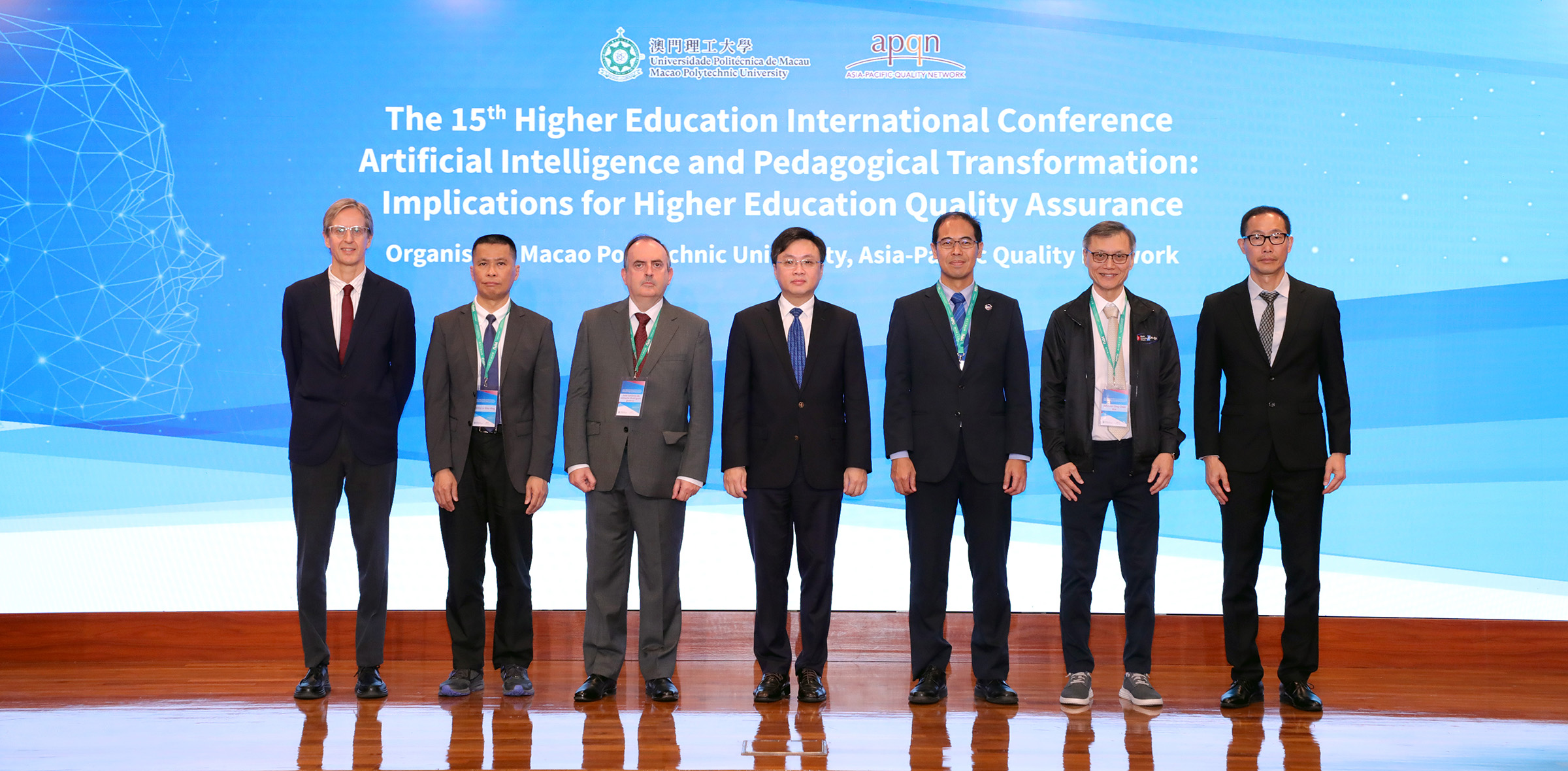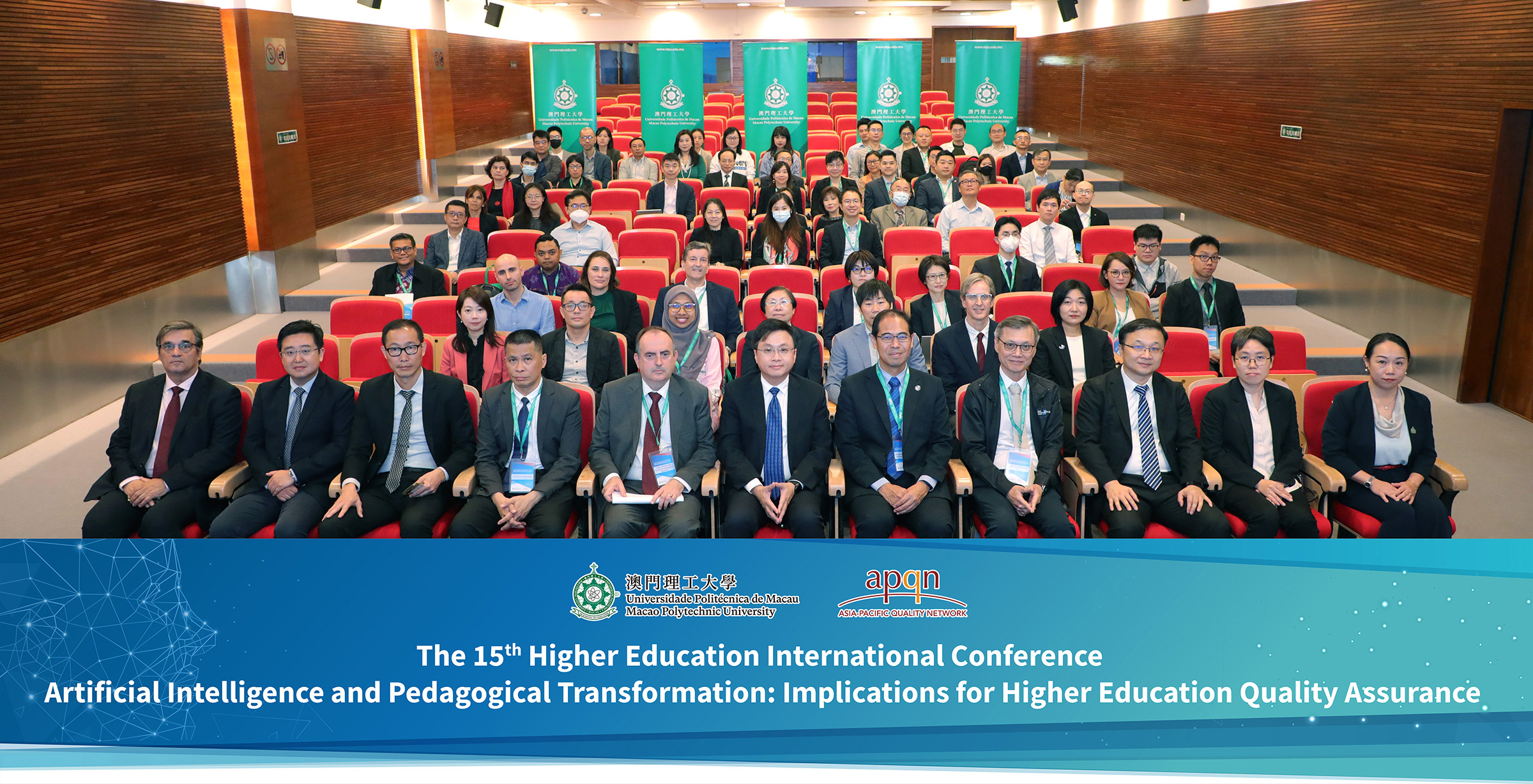Highlights
MPU and APQN Co-organise the 15th Higher Education International Conference to Explore the Development of Artificial Intelligence and Quality Assurance in Higher Education
The 15th Higher Education International Conference on Artificial Intelligence and Pedagogical Transformation: Implications for Higher Education Quality Assurance, jointly organised by Macao Polytechnic University (MPU) and the Asia-Pacific Quality Network (APQN), took place at the University on 11th to 13th December 2023. The conference brought together nearly one hundred experts and scholars from various countries and regions, including Portugal, Japan, Singapore, Malaysia, Indonesia, United Arab Emirates, as well as Mainland China, Hong Kong, Macao, and Taiwan. Together, they explored the impact of artificial intelligence (AI) and pedagogical transformations on quality assurance in higher education. The conference has successfully provided a platform for scholars and experts in the field of quality assurance in higher education to share and exchange their knowledge and expertise in the field.
The opening ceremony of the conference took place at the University on the morning of 12th December. Prof. Im Sio Kei, Rector of MPU, said in his opening speech that with the rapid development and advancement of AI, there are both opportunities and challenges in maintaining and improving the quality of teaching and learning in higher education. By applying AI technologies, higher education institutions (HEIs) can optimise teaching methods, personalise learning experiences and assessments, and improve educational outcomes. With the ninth cooperation between MPU and APQN in the organisation of the Higher Education International Conference, Macao will continue to serve as an exchange platform for scholars and experts from around the world, and promote active presentations, exchanges and sharing of valuable experiences, insights and research results.
President of APQN, Prof. Galina Motova, sent her congratulations and mentioned in her online opening speech that the pandemic has significantly accelerated the digital transformation of higher education and has transformed the teaching mode to hybrid learning in a short period of time. The rapid development of AI has become a new global normality, and universities are evolving to meet these contemporary needs by becoming more flexible and open. However, higher education is faced with the challenge of how to assess students’ skills in effective critical thinking, teamwork, creativity and problem-solving in micro-credentials, nano-degrees and digital badges. She looked forward to all participants engaging in active discussion on the challenges and risks facing higher education today.
The conference invited renowned experts in the field of quality assurance in higher education to deliver the keynote speeches. Prof. João António de Sampaio Rodrigues Queiroz, Executive Member of the Management Board of the Agency for Assessment and Accreditation of Higher Education (A3ES), Portugal, delivered his keynote speech on "Higher Education Quality Assurance: The Strategic Goals". He stated that HEIs carry out their activities in accordance with their strategic objectives to ensure the fulfilment of their training, research and promotion functions and to guarantee their commitment to society. Institutional assessment should serve as an instrument for continuous improvement of the national higher education system, covering all types of educational institutions. Institutional assessment should target the quality of performance of HEIs, assessing their strategies adopted to ensure a quality management of their activities and the extent to which they have fulfilled their mission.
Prof. Ir. Dr. Khairul Salleh bin Mohamed Sahari, Deputy Chief Executive Officer (Quality Assurance) of the Malaysian Qualifications Agency, delivered his keynote speech on “Quality Assurance of Higher Education in the Era of Generative AI”. He explained that Generative AI (GenAI) is a powerful tool that can create original content using underlying AI models. Not only has it changed the way learning takes place, it has also changed the way we learn. Quality assurance in higher education will therefore need to address these growing threats to ensure that the intended learning outcomes for students are met and fulfilled.
Mr. Johnson Ong Chee Bee, Quality Assurance Expert of the ASEAN University Network, delivered a keynote speech on “A Future-Ready Quality Assurance of Higher Education in the World of Artificial Intelligence and Disruptions”. He pointed out that today's HEIs around the world are facing various disruptions, and research suggests that by 2030, up to 70 per cent of business activities across almost all professions will be automated by GenAI. Another study found that almost half of the university students are using AI, compared to just 22 percent of the staff. These challenges have brought new thinking on how the operation of HEIs will be affected as well as the quality assurance ecosystem, and how HEIs can navigate, transform and engage with a wider ecosystem.
Prof. Lo Shiu Hing, Deputy Director and Acting Community College Principal of HKU SPACE, delivered his keynote speech on “Responses of Universities to Generative AI”. He mentioned that the emergence of GenAI has created both opportunities and challenges for universities around the world: some universities are taking a relatively liberal approach to the use of GenAI, while others have proposed ethical guidelines for its use. He presented the different responses of universities and promoted discussions through case studies, providing a direction for critical thinking for the scholars and experts at the conference.
The 15th Higher Education International Conference was divided into five sessions. Experts and scholars from around the world presented their research on the implications of AI on quality assurance in higher education, and discussed various topics such as the application of AI in higher education, AI-based assessment and feedback, quality assurance of AI-based learning, personalised learning through AI, AI and teacher professional development, AI and curriculum innovation, and ethical considerations of AI in education, making a very lively event. At the conference, the Teaching and Learning Centre of MPU also presented certificates for the “Award for Teaching Excellence in e-Learning” for academic year 2022/2023; the teaching members receiving awards are Ai Yifang from the Faculty of Languages and Translation, and Chung Siu Weng and Lai Mei Kei from the Faculty of Arts and Design.



